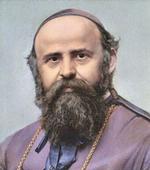How we stole a Vatican treasure
By Phil Lawler ( bio - articles - email ) | Apr 17, 2019
Well, okay, we didn’t actually steal the treasure. But we definitely did profit from the stolen goods.
The breathtaking Miserere was written by Allegri exclusively for the Vatican: to be performed only in the Sistine Chapel, and only during Holy Week. The music remained under lock and key at the Vatican for more than a century. But then the 14-year-old Wolfgang Mozart heard it performed, and later wrote down the entire piece from memory. From there the Miserere passed into the public realm. And so it was that last Sunday, our parish choir at St. John’s church in Clinton, Massachusetts, sang the Miserere as a Communion meditation.
There are a few very talented singers in our little schola. I am not one of them; I struggle to keep up. But we have an excellent director (Marc DeMille) and we sing beautiful works: Palestrina, Josquin, Tallis, Purcell. We dip into the treasury of Catholic sacred music, and scoop up one gem after another.
We had sung the Miserere in the past. But this time, I think, something special happened. Our friend Molly managed to capture a live recording; see if you agree.
After the Mass, when we gathered outside the church, we were still feeling the excitement created by the music. A few days later, one parishioner remarked about the Miserere: “I can’t stop thinking about this.” I know how he felt; in fact I’m still feeling the same way. I would describe the experience as a “high,” except that term suggests a sort of self-congratulatory attitude that is almost exactly opposite the feeling I experienced. I felt humbled by what had happened—as if the music had taken control, and my effort was incidental.
Again it was Molly who captured the feeling in words:
It really was a joy and a privilege to have the opportunity to sing something of such exquisite beauty for the greater glory of God. We each played our little part, and then it kind of took on a life of its own. We were all kind of in awe…
“Kind of in awe,” yes; that’s how I felt. I didn’t know that I could take part in producing something so beautiful. Oh, I can fill out my part in singing “Happy Birthday” at a party. But nobody is mesmerized by my voice. (When we’re recruiting new members for the schola, I suggest that our director say, “Look, if Phil can do it, anyone can do it.” Marc is too kind to take my recommendation.) Still, put me in a group with a few good singers, give us something beautiful to perform, and great things can happen.
Which is my point in writing this little essay. Your parish, too, can explore the treasures of the Catholic tradition. You might not be ready to tackle the Miserere—for that you need a soprano who can soar up to that gorgeous high C, and almost reaching it isn’t good enough—but there’s plenty of Purcell and Palestrina to keep you busy until the right voices come along.
It’s a question of will, really. Do you want something better than the formless tunes in the throwaway missalettes? Are you satisfied with the “hymn sandwich”? Or do you want to do something beautiful for God?
If you do want to discover the gems of sacred music, the first step is to find where they are hidden. Another friend, Paul Jernberg*, has devoted his life to the recovery of the Catholic tradition. Check out his new web site. Paul is organizing workshops for priests, musicians, and others who want to revitalize the tradition in their own parishes, and there’s space available at his inaugural workshop in June. You can learn what the Church teaches about sacred music—why what is appropriate for another setting may be inappropriate for the liturgy—and how to build a parish program of sacred music that is both beautiful and accessible to “ordinary” Catholic parishioners.
There’s an enormous treasure-trove waiting to be discovered. In this happy case, when one group “steals” something from the Vatican treasury, it’s not lost to the original owners. On the contrary it’s that much more available to everyone else.
*—Just by the way, Paul Jernberg is a former director of the schola at our parish, and the beautiful church you see pictured on his web site is St. John’s.
All comments are moderated. To lighten our editing burden, only current donors are allowed to Sound Off. If you are a current donor, log in to see the comment form; otherwise please support our work, and Sound Off!
-
Posted by: DrJazz -
Apr. 01, 2021 9:27 AM ET USA
Phil, I just linked to this from your "Easter in Lockdown" post (2021-03-30). What a fine performance! And, more importantly, a Catholic parish singing great music, instead of the schmaltzy pablum usually sung at Mass. Speaking as a musician of 50+ years, I can tell you that what you guys felt is what happens in every truly great performance: There's a kind of transcendent feeling that something greater is "taking over," that the music is "playing you," rather than you playing it. Praise God!








